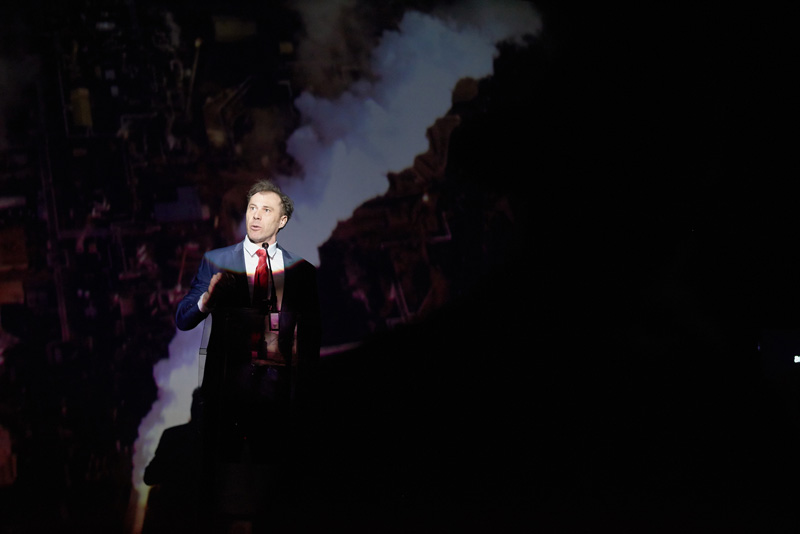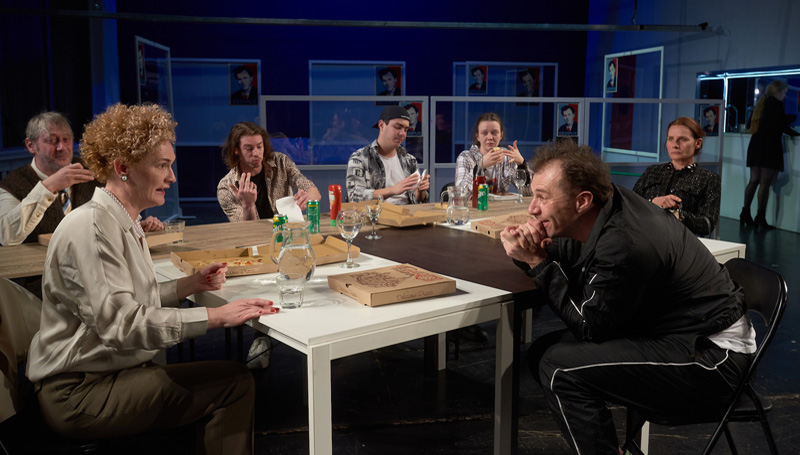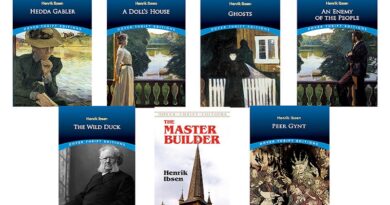Hungarian Theatre’s Interferences Festival 2022, Cluj, Romania
Dana Rufolo
18 December 2022
The eighth edition of the International Theatre Festival “Interferences” took place under the aegis of the Hungarian Theatre of Cluj-Napoca in Romania and its artistic director Gábor Tompa, president of the Union of European Theatres, from 17-27 November. I attended the opening two days and will be mainly reporting on the productions I saw during that time: Hamlet and The Chairs directed by Tompa and Oedipus directed by Andrei Șerban.

Tamás Kiss as Laertes and Zsuzsa Tötszegi as Ophelia in Hamlet.
Photo credit: István Biró.
Titled “Fear/Hope”, the festival’s thematic orientation is clarified by Tompa in his introduction to the festival booklet: When we are confronted with the contemporary violations of “fundamental constitutional, as well as basic human rights” in the interest of “significant profit for the superstate economic elite”, then theatre must “passionately seek the truth and reveal the facts, causes and mysterious interests lying behind events … Moreover theatre must inspire hope …”.
These noble words were supported by startlingly modern aspects interpolated into the two dramas which opened the festival. Hamlet and Oedipus have been linked to ancient as well as to contemporary moral values, revealing that societies have been diagnosed as sick in the past, which is fearful – but also suggesting that such sick societies have recovered, which is hopeful.
One realizes just how theatrical Shakespeare’s Hamlet really is after witnessing the stage and all the people on it sucked into a brilliantly choreographed pothole of chaos that characterizes Hamlet directed by Gábor Tompa as the opening production at Interferences 2022.
In the original late-sixteenth-century play, Hamlet keeps within the perimeters of the stage – it delights, as if we audience were royalty whose privilege it is to be entertained. This Hamlet, however, sinks into our guts, reminding us of the anxieties (such as Russia’s insane invasion of Ukraine) that pursue us like stinging flies.
We are mired in the chaos and can’t get our distance from it, which the original Shakespeare play allows us to do. Characteristic of Tompa, eerie music composed specifically for this Hamlet by Vasile Șirli highlights when fate is going to jump through the membrane of habit and surprise us with some new crisis. Hope is added on as a coda, for in the play itself what we see is endless dread.

Zsuzsa Tötszegi as Ophelia and Imola Kézdi as Gertrude in Hamlet.
Photo credit: István Biró.
The production is frighteningly contemporary, with Hamlet’s “To be or not to be” speech, matter of factly delivered by a young, healthy Hamlet in perpetual motion, Miklós H. Vecsei , that derives from a “modernized” version of Hamlet, published as the 2012 “No Fear Shakespeare” version of the play for those of us who rely on English surtitles. Hence, in the “No Fear” version, this famous speech becomes:
“ … To sleep, maybe to dream. But there’s the catch. In death’s sleep who knows what kind of dreams might come after we’ve put the noise and commotion of life behind us. … After all, who would put up with all life’s humiliations – the abuse from superiors, the insults of arrogant men, the pangs of unrequited love, the inefficiency of the legal system … when you could simply take out your knife and call it quits? … Our natural boldness becomes weak with too much thinking.”
The hyper-realism of the contemporary language of the play is undercut. There is no rational, realistic stage set to support it. The raked stage (designer András Both) contains macabre objects that remind us ominously of death: oversized human skulls positioned here and there on stage, dead ghost bodies sliding onstage in glass coffins, Hamlet’s tiny room-abode with its metallic shutters looking like a prison cell but treated by Hamlet as a sanctuary and which contains quantities of books he eventually destroys, a human skeleton hanging from pregnant Ophelia’s back.
Actions, too, escape the rationality that the language proclaims. For instance, this Hamlet’s sturdy and physically strong Ophelia (Zsuzsa Tötszegi), who is evidently deeply loved by a Hamlet sane enough to know his emotional mind, is forced to her death in a pond when she is attacked by teeth-snapping, green-and red-coiffed Rosencrantz (Éva Imre) and Guildenstern (Anikó Pethö).
Cute, childlike Gertrude (Imola Kézdi) reacts with the unmitigated remorse of a Christian sinner when Hamlet gives her a script in the “play-within-a-play” scene where she must read a text pointing out that regicide, and above all mariticide, is a moral as well as a legal crime.
At one moment when pompous but also jocular Claudius (Ervin Szücs) lies down bundled up in his fur coat, he looks like a wild beast, a bear perhaps, which is what he is in character – savage and compulsively destructive. At the play’s conclusion, after everyone has been first stabbed and then gunned down for good measure by two machinegun-toting supernumeraries just waiting their chance, we despair of ever finding an egress from the chaos on stage.
Since redemption can’t come from within this production and we can’t just walk away amused as the viewers of Hamlet frequently do, reason to hope is provided from an external source. Tompa combines the speeches of two great modern statesmen in a coda to this Hamlet meant to redeem the chaos that finds no resolution in the play proper. I am not personally familiar with these speeches and so express thanks to the Hungarian Theatre of Cluj for informing me that they begin with Jawaharlal Nehru’s 1948 speech honouring Mahatma Gandhi after his assassination. They include the lines, “The light has gone out of our lives and there is darkness everywhere.” The final lines of this ‘hope coda’ are those of Pope John Paul II’s 1978 inauguration speech, “Do not be afraid”.
I must confess that there is one difficulty which I am unable to resolve in speaking decisively about this production of Hamlet. My critique is based on the English surtitles, but they are not a direct translation of the Hamlet which the Hungarian speaking audience heard, as one might have expected. The Hungarian script is that of the Hungarian poet Arany János’s Hamlet, translated in 1863 – surprisingly, not the most recent translation made in 1999 by Ádám Nádasdy. I imagine that listening to a poetic text written when Hungary was a part of the Austro-Hungarian Empire might give rise to a dissonance between the beauty of the words spoken and the cruelty and confusion seen on stage that is inaccessible to those dependent on the English. Therefore, I conclude in stating that while what I experienced as an audience member is accurately interpreted here, I may well have missed out on a totally different sort of theatrical experience by not understanding Hungarian. The same goes for those Romanians sitting in the audience who were totally dependent on Romanian surtitles.
Andrei Șerban shows an equally direct relationship to the doomsday message of our supranational environmental problems by directing Oedipus using the version of the Greek drama of the British playwright Robert Icke. Oedipus is a politician, running for the presidency of a democratic country. His famous line that the city is polluted and that he will do his upmost to find the source of the pollution is concretized with the film projected onto the screen which acts as the backstage wall showing familiar images of plastic-clogged oceans, cracked lake beds, and floods.
The viability of this Robert Icke take on Sophocles’ drama rests most specifically on Jocasta. She is the engine. Emöke Kató as Jocasta hits all the high notes of relaxed insouciance, intelligence, and above all love (eros and storge) that allow this ritualistic mystical drama to flow into a contemporary realistic mode.

Ervin Szücs as title character in Oedipus.
Photo credit: István Biró.
The drama takes place in the evening, when sincere, good-natured Oedipus (Ervin Szücs) is at high tension. He and his family await the election results. Will he be the new president or not? When we audience entered the auditorium of the Hungarian Theatre we were assailed by campaigners distributing leaflets for one or another of the candidates. We are the populous who is privileged to watch the personal drama unfolding against the backdrop of the public contest. The family waits in a vast sparsely decorated space (with a Greek pillar motif) that Oedipus rented as campaign headquarters (designed by Dana Dima); it is located in a vaguely mythical United States of America, evidenced by a projection of a map of the country displaying voting returns state by state. However, there is certainly nothing particularly American about the dialogue or the characters.
After scenes where Oedipus announces his plan to be totally transparent about the workings of the upmost echelons of government, including a promise to investigate the true story behind the death of his wife Jocasta’s first husband, the former president Laius, the domestic scenes begin. The family is seated around a long rectangular table eating pizza as depicted in the photo at the beginning of this article by István Biró which shows Oedipus’s entire family plus Creon and his mother.
The union of Oedipus and Jocasta produced three children, all now in their late teens or early twenties: two boys and daughter Antigone. Jocasta and Creon – Jocasta’s brother – are also present. Oedipus and Creon quarrel bitterly, for Creon resents that Oedipus promised transparency without prior consultation with his team. Oedipus is particularly irked because in a prior scene where he discusses the future with the town mystic, Tiresias played by Viola Gábor, he has been told that Creon is “the winner”.
Szücs’ Oedipus reveals the irascible, acerbic side that we associate with this character as he pours out an excess of verbal threats to Creon. But this manifestation of hubris is a minor bleep when one realizes that Icke and Șerban were determined to successfully incorporate all of the Sophoclean characters, even the mystic, in this realistic production.
Oedipus’s two teenagers quarrel as well – about girlfriends and boyfriends. One lets out the secret that the other is gay, and Oedipus displays exemplary modern-day tolerance asking if the beloved makes his son happy, for that is all that matters.
In short, the petty frictions of a contemporary western family.
But meanwhile the clock is ticking. A countdown digital clock above the stage’s arch, a feature Icke’s script calls for, blinks away the seconds to reach zero at precisely the moment when all the expected bodily harming has drawn to its conclusion. Oedipus is blind, Jocasta dead, and even (unexpectedly, and to my eyes illogically) Antigone has been successful in a seduction of her uncle Creon and we hear the announcement: “Oedipus has won!” That is a striking coincidence, ripe for philosophical ponderings, but perhaps even more striking is that the audience’s parallel subvocalized replaying of the Greek tragedy also concludes at this point. For there is no doubt that the overwhelming majority of the audience is familiar with Sophocles’ Oedipus. Whenever a modern storyline is divulged that provides a logical underpinning to the fateful happenings of the original, I heard a murmur of approval all around me.
This included, above all, the vilification of Laius. In parallel with Thomas Ostermeier’s recent interpretation of Oedipus, reviewed in this online magazine (see https://playsinternational.org.uk/almada-festival-portugal-2022/ ), Laius is the sick one, the despoiler of his country and the perverter of justice. Ostermeier’s Laius is evil, but Icke’s as interpreted in this production is depraved, for when young he abused the sacred trust of friendship by raping his friend’s son. The child committed suicide by hanging himself.
Jocasta describes how Laius never reformed; he ordered his employees to find young (underage) girls – she among them – and to forcibly bring them to hotel rooms so he could pleasure himself with them. The result for Jocasta is that she became pregnant with the baby who was subsequently named Oedipus, was forced to surrender the child immediately after giving birth, and was then married to Laius, her father being influential enough to have done the country’s president harm if matters had not been made “right”.
In Kató’s interpretation, Jocasta’s loathing for Laius is palpable, and we in the audience are convinced that her deep love for Oedipus is based on an appreciation of his virtue as an honest and well-meaning human being, the opposite of her first husband (and Oedipus’s dad).
The parallel story slowly revealing itself of incest with its traditional evocation of horror becomes an expression of fate that results in Jocasta committing suicide (by hanging) as in the original Greek work but is also something that escapes the original contours of emotional reaction and tragedy, for none of the people we see on stage deserve punishment.
Like the ticking of the clock, fate is inexorable: the happiness that these humans were born expecting vanishes because human existence does not necessarily follow the path of human expectation. And so the play ends with us knowing that the carapace of social responsibility is unable to keep this Oedipus upright … and we are not surprised to learn that he – like we are ourselves – is weak.
The Interferences festival continued with a sensitive Les Chaises (The Chairs) by Eugene Ionesco, directed for the touring Théâtre National de Luxembourg by Gábor Tompa. In this production, the old couple (Oana Pellea as the Old Woman and Patrick Le Mauff as the Old Man) living in a round tumbledown room on some sort of island in the midst of water canals vanish quietly over the edges of their abode when it is time for them to end their greeting of imaginary guests who have come to hear the Old Man’s “message”.

Oana Pellea and Patrick Le Mauff in The Chairs.
Photo credit: István Biró.
Ionesco claims The Chairs is about the “ontological void”, and indeed the Old Man’s message is never delivered per se. Ultimately, a cleverly constructed robot rolls on stage and utters unintelligible words. However, the couple rushing about to provide ever more chairs for their invisible guests who have gathered to hear the message is the message, and the intensity of their activity is their objective. These two old people desire that their lives have had meaning. The message is that desire, merely – not words.
Some of the other dramatic works shown at the Interferences festival include In the Name of the Lord by András Urban who also directs; Waiting for Godot by Samuel Beckett, directed by Gábor Tompa; Christoph Marthaler and Graham Valentine’s Aucune Idée (No Idea); Young Barbarians directed by Attila Vidnyánszky; The Toth Family also directed by Vidnyánszky and written by István György Örkény; Iulia Pospelova’s Here Moscow Calling directed by Catinca Drăgănescu, as well as dance and choir groups. Among many off-festival events, the actors and creatives of each of the productions gave a talk, offering additional insight into the development and intentions of their piece.









